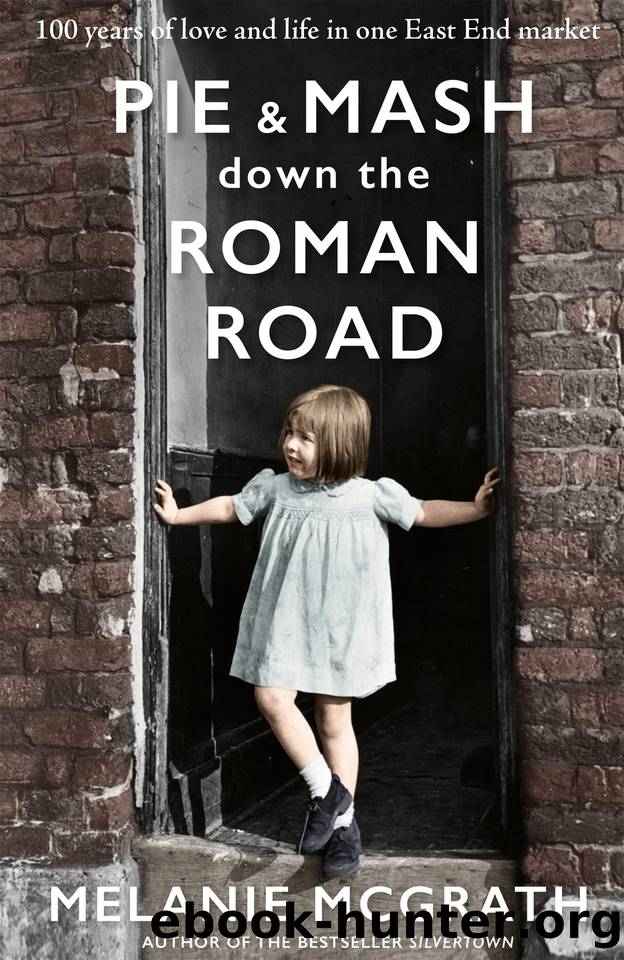Pie and Mash Down the Roman Road: 100 Years of Love and Life in One East End Market by Melanie McGrath

Author:Melanie McGrath [McGrath, Melanie]
Language: eng
Format: epub
Tags: History, Social History, Europe, Great Britain, 20th Century, Non-Fiction
ISBN: 9781473641976
Google: 1WEZtAEACAAJ
Publisher: Hodder
Published: 2019-09-02T23:00:00+00:00
Chapter 19
I didnât want to go back to London . . .
Phil Price
As the sun goes down on Sunday, 1 April 1945, the lights come on in London. On Monday, 8 May the war in Europe is over. On Sunday, 2 September itâs finished across the world.
From the Kellysâ shops in Bethnal Green and Bow the views are of drab, pinched, exhausted ruins of rubble from which buddleia and old manâs beard burst in cheery sprigs. The area looks like a bad set of dentures: discoloured, smelly and uneven, full of gaping holes. Over a million London homes have been destroyed and most of these are in the East End. In the Roman, Bow Baths, the dairy behind Arberâs and the Needle Gun pub are all as good as gone. On Fish Island, Clarnicoâs is wrecked and the timberyards devoid of timber. Five minutes to the north, the lido where Ann Simmons swam and the pagoda where Ted Lewis picked up girls are collections of wreckage now. The ironwork railings and ornate gates which once surrounded Vicky Park are gone, and where there were once neat grass lawns there are now gun emplacements and prefab lodgings for POWs. The formerly immaculate flowerbeds are sprouting cabbages.
At the end of 1945 a steady stream of demobbed soldiers and sailors are arriving back in Bow, among them Gary Arberâs brother Stanley and Ron Mossâs brother Charlie. One of the first to arrive is Harry Da Costa. Since February 1944 heâs been serving as a cook in the Navy, making an old childhood dream come true. Heâs in Malta when the war ends and is judged eligible for early release only so long as he agrees to go back to tailoring for at least six months. Thereâs a need for civilian clothes. The journey back home by boat to Toulon and from there by train to Marseille and all the way across France to Calais then to Dover and London takes two and a half days. By early 1946 Harry is back in Bow cutting cloth, but he soon decides heâs not cut out to be a tailor. Costermongering is in his blood. Once his obligatory six months is over, he packs in the tailoring game and sets up a stall in the Roman with his brother Joel. Among their first items for sale are deflated barrage balloons, which the brothers repurpose as vehicle covers for vans, barrows, cars, carts, what have you. Tremendous success, they are, those barrage balloon-cum-vehicle covers.
A few stalls down from Harry and Joel, Bill Old, newly back from a Japanese POW camp, resumes selling fruit and veg, but itâs quiet now and for the most part supplies are harder to come by than they were during the war. Even with the children returning from evacuation and the men from the fighting, Londonâs population has fallen by 2,250,000; it wonât reach its 1939 level again until well into the next century. The bulk of the loss is felt in the area where there is most damage, which is to say, the East End.
Download
This site does not store any files on its server. We only index and link to content provided by other sites. Please contact the content providers to delete copyright contents if any and email us, we'll remove relevant links or contents immediately.
What's Done in Darkness by Kayla Perrin(25500)
Shot Through the Heart: DI Grace Fisher 2 by Isabelle Grey(18219)
Shot Through the Heart by Mercy Celeste(18160)
The Fifty Shades Trilogy & Grey by E L James(17774)
The 3rd Cycle of the Betrayed Series Collection: Extremely Controversial Historical Thrillers (Betrayed Series Boxed set) by McCray Carolyn(13189)
The Subtle Art of Not Giving a F*ck by Mark Manson(12912)
Scorched Earth by Nick Kyme(11832)
Stepbrother Stories 2 - 21 Taboo Story Collection (Brother Sister Stepbrother Stepsister Taboo Pseudo Incest Family Virgin Creampie Pregnant Forced Pregnancy Breeding) by Roxi Harding(11040)
Drei Generationen auf dem Jakobsweg by Stein Pia(10217)
Suna by Ziefle Pia(10186)
Scythe by Neal Shusterman(9259)
International Relations from the Global South; Worlds of Difference; First Edition by Arlene B. Tickner & Karen Smith(8608)
Successful Proposal Strategies for Small Businesses: Using Knowledge Management ot Win Govenment, Private Sector, and International Contracts 3rd Edition by Robert Frey(8419)
This is Going to Hurt by Adam Kay(7695)
Dirty Filthy Fix: A Fixed Trilogy Novella by Laurelin Paige(6453)
He Loves Me...KNOT by RC Boldt(5804)
How to Make Love to a Negro Without Getting Tired by Dany LaFerrière(5378)
Interdimensional Brothel by F4U(5304)
Thankful For Her by Alexa Riley(5161)
